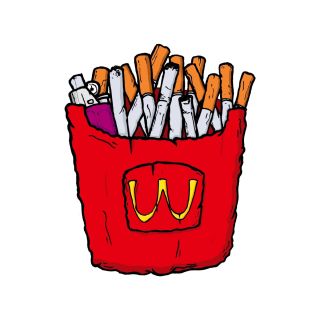Addiction
5 Ways "Food Addiction" and Drug Addiction Intersect
It acts a lot like drug or alcohol addiction, but there are key differences.
Posted January 13, 2023 Reviewed by Tyler Woods
It’s an open question among researchers whether "food addiction" reaches the level of true addiction, but it’s becoming increasingly clear that food addiction at least exhibits many of the same characteristics.
I’m an addiction psychiatrist and have made my career in the substance use addiction world, but I’ve always been intrigued by the parallels we see with food addiction. One of those parallels involves brain chemistry, and, in fact, I discussed this very topic in a paper I co-authored in 2007 called “Addiction to Food and Brain Reward Systems.” (More on the brain reward phenomenon below.)
Brain chemistry is just one area of similarity between drug and food addiction. There are several others—as well as key differences.
Similarities and differences between food addiction and drug addiction
1. The similarities are many…High-processed foods are engineered with large amounts of added fat, refined carbohydrates, salt, and food additives to maximize palatability. These foods can help cause addictive-like eating behaviors, just like drugs and alcohol do. These behaviors may include:
- Preoccupation with a certain food
- Facing social consequences from overuse
- Engaging in risky use (i.e., binge eating)
- Consuming food at a dangerous level
- Loss of control when consuming food
- Feelings of guilt and shame about eating
2. …but the differences are telling: The big one for me starts with the fact that you need to eat in order to live, but you don’t need cocaine, heroin, or alcohol to live. Among other things, this impacts treatment options. When you have a food addiction, you can’t abstain from food. You need it to sustain life.
Two other differences between food and drug addiction relate to tolerance and withdrawal. In drug addiction, tolerance is needing more and more of a substance to gain the same effect. This rarely, if ever, happens with food.
The same goes for withdrawal, which happens when someone stops using drugs or alcohol cold turkey. Symptoms may include nausea, muscle aches, sweating, depression, anxiety, and extreme fatigue. Without medication assistance and physician supervision, drug or alcohol withdrawal can be deadly. With food addiction, withdrawal has not been well studied, but it’s clear the symptoms don’t reach the level of drug or alcohol withdrawal. Some people report having cravings, headaches, sleepiness, and temporary insomnia when they stop eating certain highly processed foods.

3. Stimulating the brain’s reward center: This part of the brain is key to our survival, and it’s also where the neurotransmitter dopamine gets released to “reward” certain behaviors. When people do drugs or take alcohol, the dopamine surge causes pleasure, and certain individuals get addicted to it—thus returning to it again and again.
Research shows that certain foods, especially highly palatable processed foods, can have this same outsized effect on the brain’s reward center. As with drugs or alcohol, these foods eventually drive the desire to return to them again and again.
4. Eating disorders and substance use disorders often co-occur: This co-occurrence can manifest itself by way of what’s called “symptom substitution.” Originally a Freudian concept, a common example of symptom substitution is when a person goes into rehab for their substance use. Once they stop using, they sometimes switch to eating more, and rapidly gain weight. In effect, they replace a drug addiction symptom with a food addiction symptom.
Why does this happen? If we just look at the brain chemistry part of it, people unconsciously look for the dopamine fix from foods that they can no longer get from drugs or alcohol. This is why it’s so important to treat co-occurring conditions—eating disorders and substance use disorders, in this case—at the same time.
5. Food addiction, like drug addiction, requires professional help: Whether food addiction is a true addiction or not is beside the point for people who are living with it. Having a food addiction may cause deep and ongoing anxiety and depression and can severely disrupt a person’s life, livelihood, and relationships. The best course of action if you suspect you or a loved one has a food addiction is to seek medical help.
Bottom line: As with drug addiction, do-it-yourself methods aimed at controlling your food and eating urges rarely work. It’s not a question of showing more willpower. Rather, food addiction is a complex health condition that involves neurochemical, genetic, environmental, and behavioral factors, often in combination. Fighting all this alone, without professional treatment and support, is rarely a successful strategy.
Regarding where to go for help, it’s fine to start with your primary care provider or your therapist for advice on next steps. Ultimately, however, you’ll want to see a provider with specific expertise in eating disorders.
To find a therapist near you, visit the Psychology Today Therapy Directory.
For more information, support, and physician listings if you or a loved one needs help with a suspected food addiction, contact the National Eating Disorders Association (NEDA) at 800-931-2237, or visit nationaleatingdisorders.org.
References
Jorandby, L., Pineda, K.F., and Gold, M. (2007). "Addiction to Food and Brain Reward Systems." Sexual Addiction & Compulsivity.




